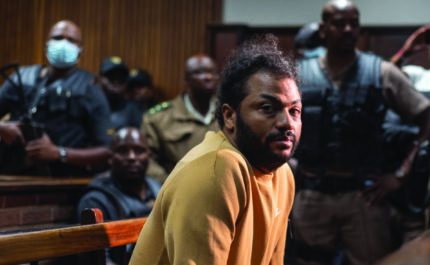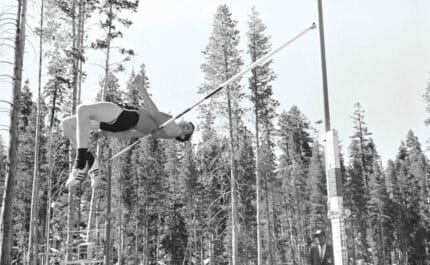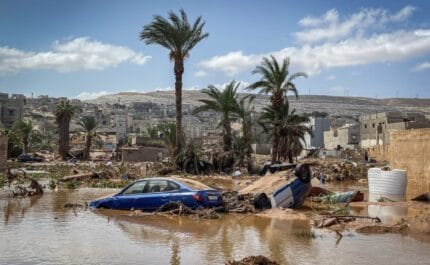The cruel sea
The lives of refugees and migrants were once again weaponised in the summer of 2020 as political tensions rose in the Aegean. In DG #40 we reported on the humanitarian fallout from the standoff between Greece and Turkey
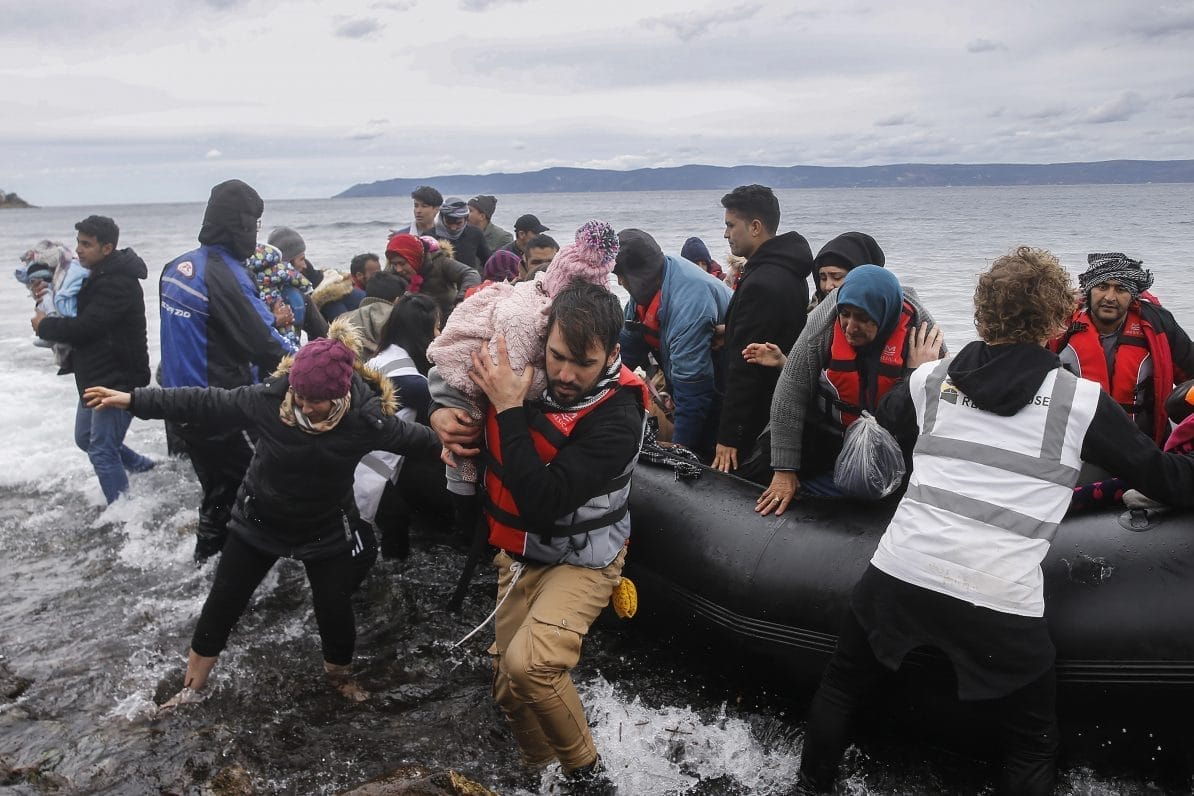
Syrian migrants arrive at Lesbos island on Greece having made the crossing from Turkey, 28th February 2020. Photo: Ayhan Mehmet/Anadolu Agency via Getty Images
8th Sep 2020 (Taken from: #40)
It begins as a tiny, blinking dot on the radar screen. Ahead, out of the ship’s front window, a floating object is briefly visible. The sea is wild and the object seems to be moving up and down, disappearing within the waves. We are aboard a Turkish coast guard vessel in the middle of the Aegean Sea and as we approach the object it becomes clear that it is a small, orange and black inflatable raft. The wind is so strong and the waves so rough that even our powerful boat has difficulty navigating the conditions. We move closer. We see people on the raft.
Closer.
It is difficult to count, but there are maybe 17 people aboard. Men, women and children. They are waving and screaming for help.
Closer.
Their clothes are soaking wet. The people on the inflatable raft are in shock, shifting from a state of catatonia to one of frenzy.
It is early on the morning of 8th September. Half an hour earlier I had received a phone call from the Turkish coast guard. I had been expecting it. “There’s a possible case,” the caller said. “If you can be at the harbour in less than ten minutes, we’ll wait for you.”
I had been on stand-by near the harbour in the coastal town of Ayvalik in eastern Turkey for two days. I had come to report on allegations that boatloads of migrants and refugees crossing the Aegean Sea from the Turkish coast to the Greek island of Lesbos were being turned away by Greek authorities. These so-called ‘pushbacks’ are illegal under international law.
Normally it’s difficult for journalists to get permission from Turkish authorities to observe their operations. But Turkey and Greece have been in renewed dispute about maritime borders and the search for gas and oil in the eastern Mediterranean Sea. Tensions had been rising throughout the summer. The Turkish coast guard and, by extension the Turkish government, wanted the media to see this.
“Please! Help us!” one of the migrants on the boat screams in accented English, as waves slosh over the raft. As our vessel approaches, two Turkish coast guard officers scramble to pull on Covid protective gear: body-covering white suits, gloves and face masks. Another officer throws a rope into the water. The wind makes it difficult for the people on the raft to retrieve it. One eventually manages to grab the rope, and the men on the vessel pull it in.
One by one the migrants are heaved onto the deck. Young men and women, a baby and an elderly woman barely able to lift herself up. An old man is carried by his companions. All their clothes are soaking wet. They do not have bags. Each is handed a face mask and told to sit down on the open deck. They sit shivering in silence as the vessel speeds back towards the Turkish coast.
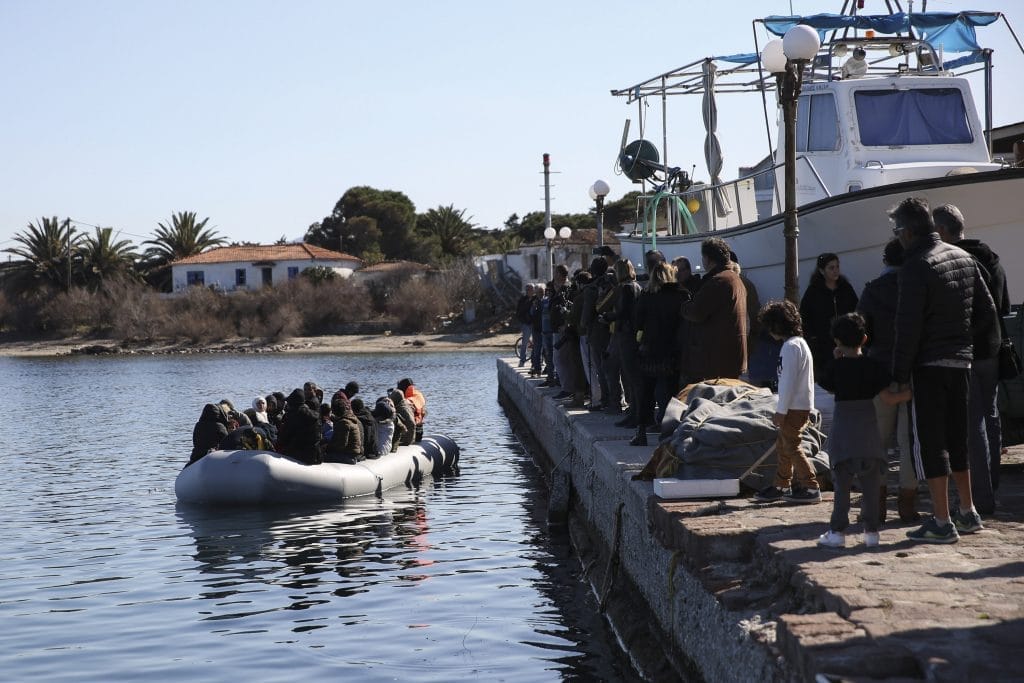
Migrants arriving on an inflatable boat at Thermi on Lesbos island are prevented from disembarking by far right extremists, 1st March 2000
The migrants and refugees are all from Somalia, they tell me after being taken to the nearest coast guard base in the town of Dikili. One of the women, Sumaya (she would not give me her surname), is almost apologetic about getting into trouble and having been saved. But, she says, they had no choice. “We had to try.”
The group had been in Turkey for a couple of months, after escaping their home country in January. Somalia has seen decades of war, natural disasters and extreme poverty. Over the last 30 years, hundreds of thousands of Somalis have fled the country. Sumaya, who is 19, says that she left with her brother in search of a better future elsewhere. They had met the other Somalis in Turkey and decided to team up to find a way to get to Greece and then on to Germany. “I was thinking of Germany, because it’s a big country,” she explains. “But it didn’t really matter, as long as it was Europe”.
Like most migrants and refugees, the group left Turkey with the help of a smuggling network, operating from the Turkish coastal city of Izmir. Smugglers arrange boats and tell passengers when and where to go. They usually send them on their way on dark nights when the sea is calm. On the day they departed, Sumaya and her group managed to reach the island of Lesbos – a journey of just 36 kilometres – before sunrise.
They were saying: ‘This is a lesson for you guys, may you never come back to this sea’”
“We were walking on the island, in the mountains, it was a really rough area, it was not easy to walk. We wanted to go to the city, but the police came and they caught us,” Sumaya recalls. “I think they were coast guards, but I’m not sure, they were wearing masks. Who knows who they were. They looked like an army.”
She describes how the group was pushed into vans and driven back to the sea. There they were forced onto a ship. “It was a big boat,” Sumaya says. “They took our money, phones, luggage, everything. They were beating everyone. They were even stepping on people. Women and men were the same to them. They were beating us as if we were animals.”
It is nearly 30 degrees in the sun, but Sumaya is still shivering as she tells me her story. Once the boat reached open sea, the masked men took out an inflatable raft, pushed the group of 17 people onto it, and then left. “There was no motor, it was just a rubber tube,” says Sumaya. “They were saying: ‘This is a lesson for you guys, may you never come back to this sea’. They never cared about us. We were not humans to them.”
Reports of masked men attacking migrants on the land border between Greece and Turkey have been made frequently over recent years. As of March 2020 such groups have started showing up at sea too. Witness reports describe unidentified masked men on high-speed boats. They don’t speak much, and they are often violent. Videos made by migrants show the men disabling the engines of their boats. Migrants have also started returning to Turkey with stories about how they were picked up on land, after they’d made the crossing, and sent back to sea.
“Since the beginning of this year we have observed a huge increase in pushbacks, both in scope and brutality,” says Natalie Gruber, co-founder of Josoor, an Austrian NGO that monitors the mistreatment of people at Europe’s borders. “The new trend is these life rafts that are being used to push people back, for people intercepted at sea, and also those who have arrived at land. These people are not registered [as asylum seekers], and are taken to these life rafts and left abandoned at sea.”
According to EU and Greek laws, UN treaties and several international human rights conventions, any person who crosses a border into a country has the right to ask for asylum. Those who sail over the maritime border into Greek waters should be taken to land and given the opportunity to explain their case. “Pushbacks are illegal in and of themselves,” says Gruber. “But if you now start expelling people who have already arrived on land, there is no guarantee for the right to claim asylum at all any more.”
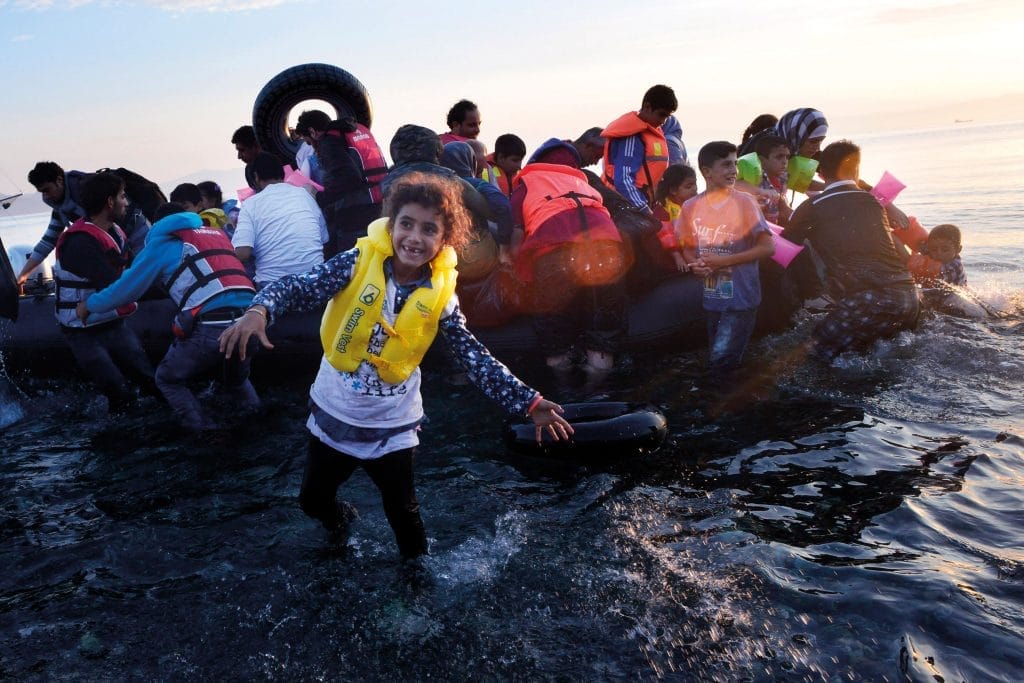
A Syrian child smiles as refugees arrive at a beach on the Greek island of Kos after crossing part of the Aegean Sea in a dinghy, 15th August 2015
Until recently it was suspected that the masked men were members of far right militias connected to the neo-Nazi Golden Dawn party. Similar groups have been documented pushing back migrants and refugees who arrive by land in Bulgaria and Hungary. But in June a team of journalists from Bellingcat and Lighthouse Reports released the results of an investigation into pushbacks in the Aegean. Using open source intelligence as well as videos and photos made by migrants and refugees, they concluded that the pushbacks were likely to have been orchestrated by groups which were cooperating with – or possibly even part of – the Greek coast guard. Vessels on which masked men have been photographed appear to be the same model as those used by the Greek authorities. One photograph even shows a masked man wearing a jacket emblazoned with the logo of the Greek coast guard.
A subsequent investigation by Patrick Kingsley for the New York Times published in August revealed that Greece had secretly expelled around 1,000 migrants and refugees by dropping them at sea and abandoning them in insecure inflatable rafts. The right-wing Greek prime minister Kyriakos Mitsotakis claimed in an interview with CNN that the reports were part of a Turkish “misinformation campaign”. When I put the claims to the Greek government they said they respected EU and international law. “The men and women of the Hellenic coast guard are operating with consistency, determination and sensitivity in human life,” Giannis Plakiotakis, the Greek minister for maritime affairs, told me in an emailed statement. “Turkey actively seeks the illegal entry of refugees and immigrants into Greece.”
Greece has been overwhelmed by the arrival of hundreds of thousands of migrants and refugees since the peak of the crisis in 2015, when more than a million people crossed into Europe using the so-called ‘Balkan route’. Huge groups were moving, often on foot, from Turkey to Greece and on through what is now known as North Macedonia, Serbia and Hungary, making their way to richer European countries like Germany, Sweden and the Netherlands.
Faced with thousands of refugees massing on the German border, and an unfolding humanitarian crisis, chancellor Angela Merkel took the decision to allow them into the country. Later, she told the nation that “Wir schaffen das” (“We can handle this”), offering residency to all arriving refugees.
But many other countries struggled to handle the flow of people, both in terms of infrastructure and public mood. Negative headlines started appearing in European newspapers. Were they really refugees, or economic migrants who want to steal citizens’ jobs? Were they members of Isis in disguise? If countries took them in, how many more would come? Populist right-wing politicians sought to exploit the crisis. Photos of crowds of migrants walking across borders featured in election campaigns in the UK, Poland and Hungary. Hungary and Bulgaria put up fences to seal off their borders.
For Europe, the immediate crisis came to an end with the infamous 2016 EU-Turkey deal. According to the UNHCR, Turkey hosts the biggest refugee population in the world, close to four million people. The EU asked Turkish president Recep Tayyip Erdogan to stop them from leaving Turkish soil. In return Turkey would receive at least €3 billion worth of EU funds every year to improve the living situation for migrants and refugees, with the prospect of more financial support in the long run.
Turkey desperately needed the money. But there were other incentives to accept the deal. Turkey’s EU-accession negotiations would be restarted and, perhaps most importantly, talks would resume on visa-free travel to the EU for Turkish citizens. What’s more, for every Syrian refugee that Turkey took back from Greece, EU member states would take in one Syrian refugee from Turkey directly.
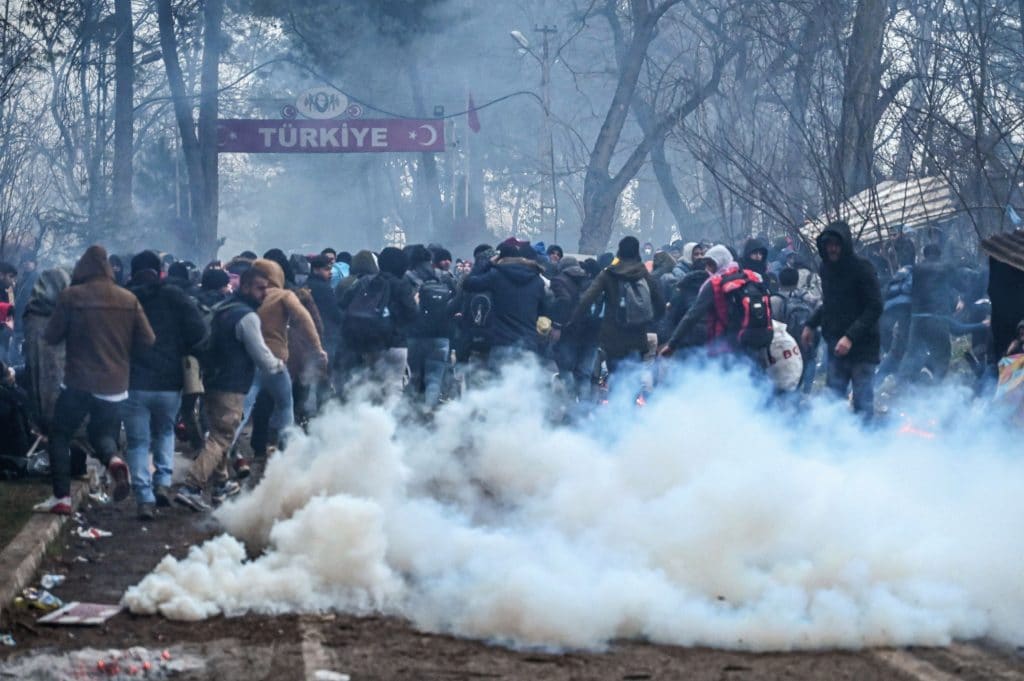
Migrants run away as Greek anti riot police officers use tear gas on the buffer zone on the Turkey-Greece border at Pazarkule, 29th February 2020
Four years later, the deal is on life support and the relationship between the sides has deteriorated. “The deal was a temporary solution,” Kati Piri, a Dutch member of the European Parliament, tells me. “At the high point of the refugee crisis 7,000 people were arriving on Greek islands every day. People were drowning. So something needed to be done. And in the first months the deal did seem to work. The numbers immediately dropped. It looked as if the problem had been solved.”
But the problem had just been put on hold. Turkey’s leaders claimed that the promises that had been made had not materialised. They had a point, says Piri, who was the European Parliament’s Turkey rapporteur at the time. “I do not often agree with the Turkish government, but the EU has failed to do what it promised to do,” she says. “To lift the burden off Turkey and resettle refugees in EU countries. Only about 25,000 refugees have been relocated, mostly in the first year after the deal. But there are millions still in Turkey. So it’s nothing.”
It was an agreement without a long term plan or vision, Piri says. “The problem was not directly visible for Europe any longer. People were not coming in thousands per day anymore. So the pressure was gone. There was no willingness in EU member states to continue the financial support to Turkey. But we forgot there is still war in Syria, and there are still people in need.”
The EU blames Turkey for using refugees and migrants as a means to crank up political pressure whenever it wants something. In one such case on 28th February 2020 Erdogan decided to open the land border to Greece, telling migrants and refugees that they were free to go as they pleased. The move appeared to be a retaliatory strike by Erdogan, who felt betrayed when the EU didn’t support his military operations in northern Syria, after Turkey had lost 36 soldiers in an airstrike. “We opened the doors,” he said on live television. “Why? The European Union needs to keep its promises. We are not obliged to look after and feed so many refugees. If you’re honest, if you’re sincere, then you need to share.”
Within days thousands of migrants and refugees had flocked to Turkey’s north-western border with Greece. Migrants began getting messages over WhatsApp saying that buses had been arranged by municipal authorities to transport people to the border. But Greek border police were determined to stop them. Riots broke out, teargas was fired and very few people made it to the other side.
Some of the world’s most vulnerable people were being weaponised in a political standoff between Turkey and Europe. Many had sold everything they had in anticipation of making it to western European countries after getting to Greece. But they had been misled, and had to return to a life of insecurity and poverty. Many continue to await a fresh chance to leave.
Izmir’s clean and bustling seafront boulevards are lined with modern shopping centres. But if you walk ten minutes to the east, you find a completely different world. The Basmane neighbourhood is one of Izmir’s oldest quarters. The area has always been the poorest and most multicultural place in the city. There are Greeks, Armenians, Turks, Kurds and Roma living alongside one another. The houses are colourful but poorly built and every other building looks in bad shape. The entire district is a maze of steep streets leading up a massive hill that is visible from all over the city.
Over the past few years it has become the first stop for migrants and refugees arriving in Izmir, and around 300,000 Syrians now live here. Many chose Izmir over Istanbul to be closer to the coast and the crossing point to the Greek islands. A wide network of people-smugglers have their base here, too.
I wanted to speak to more people who had tried to cross to the other side. And it doesn’t take long to find someone. While buying some fresh figs, I ask the fruit seller if he knows anyone. He is one of the many Syrian refugees to settle here and start his own business. Speaking in broken Turkish he says that he has tried crossing to Greece himself several times. He is not attempting crossings any longer – it has become too dangerous – but he knows someone we should meet. He walks to the shop opposite and talks to the owner for a few moments. The owner makes a phone call and less than five minutes later a tall, thin young man arrives.
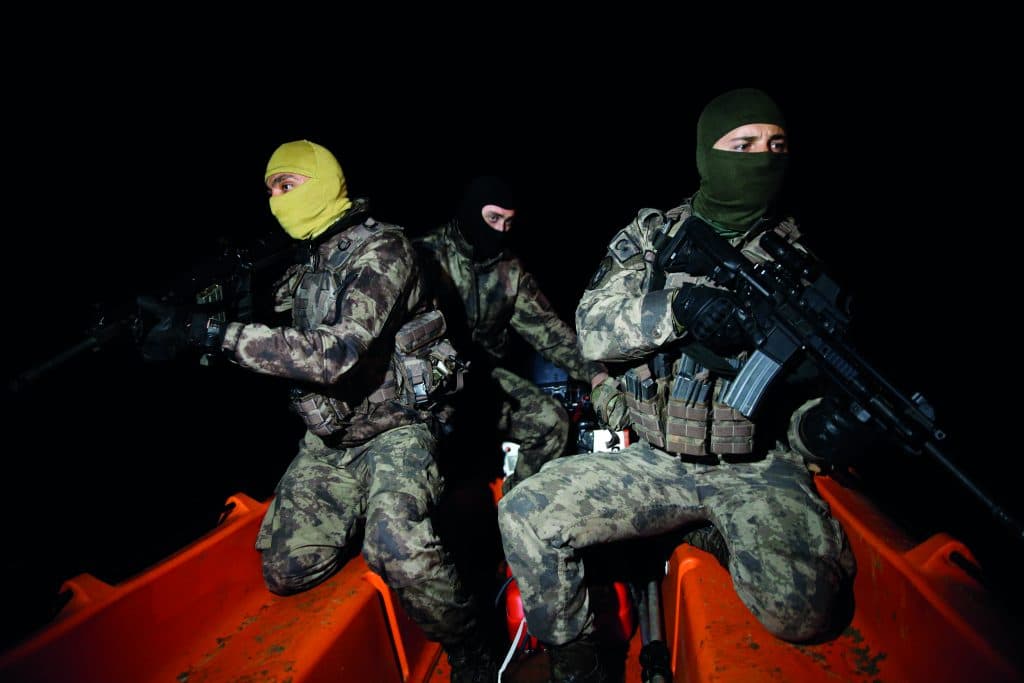
Turkish officers deployed to prevent push-backs of migrants by Greece petrol the river that borders the countries, 9th March 2020
Amjad is from Gaza. He speaks softly about how he got to Izmir, and how he tried to leave. He had lived his whole life under the threat of war and in 2014, when Israeli forces bombarded the Palestinian territory, his family home was destroyed. “My younger brother was killed, my older brother lost his leg and I got injuries to my stomach,” he says. He was a law student who knew about the protections afforded to refugees and was sure he could make a case for himself. He had also met a girl online, through family contacts. She is a Palestinian from Syria, who escaped the war there a few years ago and found refuge in the Netherlands. They fell in love, Amjad says. But they have never met in person. It gave him the energy and motivation to leave. “I escaped, I searched for a place where I can find safety for my life,” he says.
Getting to Turkey was the easy part. In Istanbul he worked in a hotel for several months, to earn money for the next part of his trip. For that he came to Izmir. “In May we headed to the sea to go to Greece,” he recalls. He paid some smugglers, who added him to a group of people, a mix of refugees from Syria and Afghanistan, who would cross together. The plan was to sail to nearby Samos island on an inflatable boat. There were children and a heavily pregnant woman in the group. The boat set sail at 4am, in the dark, for the 28 kilometre crossing.
“We were nearly on Samos when an airplane appeared and spotted us,” says Amjad. “After ten minutes, a big ship came and [the people onboard] attacked us.”
He’s not sure whose ship it was, although he believes it had come from Samos. Amjad says that the men on the ship used a metal spear to destroy the engine of their boat, before shooting into the water around them. “We tried to stop them at the beginning and to protect ourselves, and tell them some sentences in English like ‘We are peaceful, we are refugees, we are Syrians, Palestinians’. We lifted up a kid to show them that we have kids on board so they can rescue them. One of the men on the ship said to us, ‘Throw him in the sea’.”
The men were first taken onto the ship, Amjad says, and beaten up. After a while the whole group was put into two inflatable rafts and dropped in the middle of the sea. All of their possessions were taken. “I was the only one who was able to hide my phone, which I put in my underwear,” Amjad says. He shows me the videos he took when it was safe enough. They show the group inside the two orange rafts. There’s a long rope between the rafts and the ship, which looks like a high-speed coast guard rescue vessel. People are screaming. And then the rope is cut.
They floated on the sea for about six hours. Finally the Turkish coast guard approached them. Even though they had been spotted, the coast guard waited two hours before rescuing the people on the rafts as they floated between Turkish and Greek maritime waters.
Stand-offs like this happen often. On 9th September, I was scrambled to witness another Turkish coast guard rescue operation, this time at night. The Turkish coast guard had sighted a rubber boat full of Afghan Hazara refugees, a Persian-speaking Shia minority who, according to the UNHCR and a series of human rights groups, are brutally persecuted in Afghanistan.
There were 38 people onboard including many children. Their engine had broken down. After approaching them on the open sea, the Turkish coast guard did not rescue them immediately. The boat was floating in Greek waters, they said. We could see on the radar that a Greek coast guard vessel was nearby. We waited for an hour until the wind pushed the boat full of desperate people into Turkish waters and was taken back to Turkey.
Amjad has been back in Izmir for a few months now. He is working on a construction site where he earns €10 a day. “Turkey is good for its own citizens, but as a refugee life is difficult,” he says. “I am working. I live with 11 roommates to be able to afford rent. I want to get married, to have kids, to have a life and a future.” He says he will try crossing to Greece again. He hopes that one day he will get to the Netherlands and will be able to marry the girlfriend he only knows through his phone. “I was expecting Europe to respect human rights, and deal with us refugees in a humane way, but from what I saw there was no humanity or mercy. What they did to us was horrible.”
It’s a view shared by Human Rights Watch, which has published several reports about pushbacks. “We are talking about coordination between the Greek police and the Greek coast guard as well as unidentified armed masked men, who very possibly belong to the coast guard special forces,” says Eva Cosse of Human Rights Watch in Greece. The organisation has collected dozens of witness accounts that mirror what Amjad and Sumaya, the Somali migrant I’d seen rescued, had described.
Human Rights Watch has been calling on the Greek government to investigate these cases, but has been given short shrift. “Greece is completely denying such allegations,” says Cosse. “They say it is fake news, created by Turkey, and that Greece is not conducting such practices. But they do say they have managed to prevent the arrival of many more migrants, practically acknowledging that Greece is pushing back people, and preventing them from entering Greek soil.”
Cosse is also concerned about the lack of condemnation from the European Union. “EU and member states have been silent about these practices for years; it’s connected to the fact that it is to the benefit of Europe to keep people out. So Greece is doing the dirty work for the European Union.” Meanwhile the four million migrants and refugees who remain in Turkey are increasingly desperate. Turkey has been accused by human rights organisations of sending people back to war zones in Syria, Afghanistan and Iraq.
In the Basmane neighbourhood people smugglers operated quite freely and openly during the height of the refugee crisis in 2015. Agents would approach people in the streets, offering them a boat trip to Lesbos, Samos or Chios, as if they were tourist guides luring people to take a pleasure cruise. The deal would guarantee arrival, with people promised their money back if anything went wrong. The cost fluctuated due to supply and demand, from a few hundred to a few thousand euros. It was a major business.
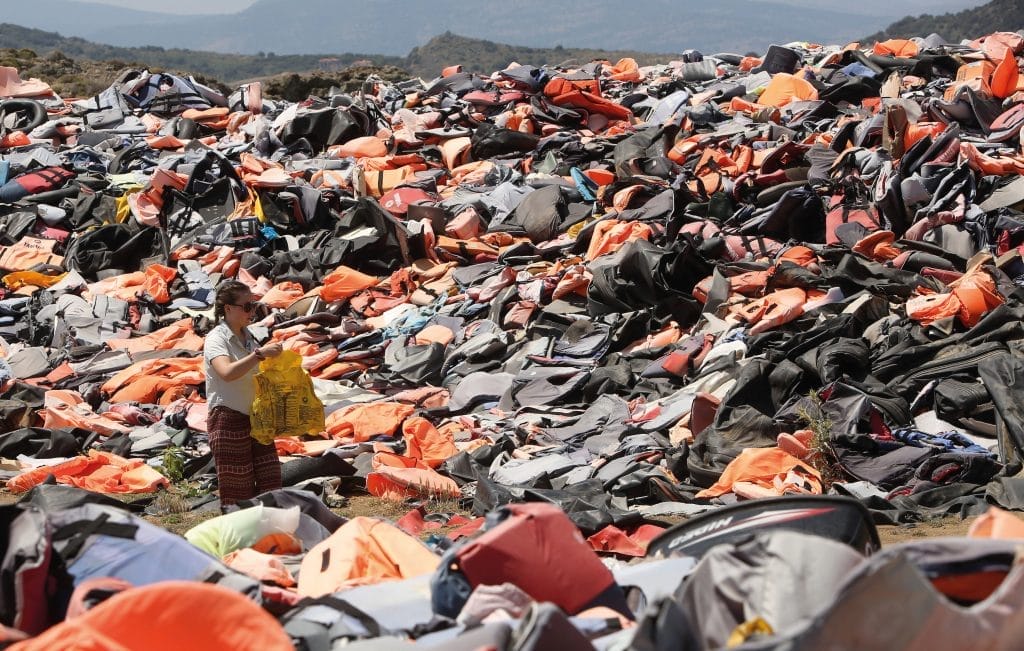
Thousands of used life preservers and rafts used by migrants to cross from Turkey to Greece lay in a pile on the island of Lesbos,23rd May 2018
After the EU-Turkey deal, the number of crossings went down. For a while Turkey wanted to show that it was upholding its end of the bargain. The authorities no longer turned a blind eye to smugglers and many were arrested after 2016. But the business of people-smuggling in Basmane did not stop entirely: there were still migrants and refugees willing to try their luck and people prepared to help them for a price.
In the yard of his dusty teahouse, I speak to one of Basmane’s most successful smugglers. He does not want to be identified, but he tells me that business has become problematic since the Greek pushbacks began. Refunds for unsuccessful trips have cut into his profit margin. He has now focused his energy into building a hostel next door to the teahouse and says he will start hosting migrants and refugees who are stranded here for five euros per night. But he’s not arranging crossings to Greece, for the moment at least. “Maybe it will change in a few months,” he says. “Others are still doing it. But for me, it’s too risky. They are all coming back because of the Greeks.”
In early September the Greek maritime minister Giannis Plakiotakis proudly told the world that Greece had managed to stop some 10,000 migrants and refugees from entering the country this year. He said that the numbers of arrivals on islands were down by 95 percent in August, compared to the previous year. He did not elaborate on how the fall in numbers had been achieved and Greece denies the use of force, violence and the practice of pushbacks in general. Plakiotakis has said that it is in fact the Turkish coast guard that has been actively escorting migrant boats towards Greek territorial waters and causing problems. In April, Greek media had reported on such a case, showing video footage of a Turkish coast guard speedboat in close proximity to a migrant boat on the maritime border line. The headline read: ‘Turkish coast guard ship spotted escorting migrant boats into Greek coastal waters.’ Turkish officials have strenuously denied those allegations, as did the coast guard crew I was embedded with.
The story of migrant and refugee pushbacks is only the latest chapter in a long history of political disputes between Greece and Turkey, which flared up once again over the summer of 2020.
In the eastern part of the Mediterreanean both countries claim access to oil and gas reserves in the area where Turkey has disputed its official maritime borders with Greece and Cyprus for decades. Tensions increased further in August and September, when both countries sent navy ships to sea in a fit of sabre-rattling. The European Union is still attempting to calm the situation down.
Meanwhile reports of sea pushbacks continued throughout October and November. A second Bellingcat and Lighthouse Reports investigation published in October appeared to show the involvement of Frontex, the European Union border agency, in also pushing back migrants and refugees at sea. Frontex has long assisted Greece, as well as other countries, in protecting the EU’s external borders. The agency had earlier denied knowing of any wrongdoing by the Greeks, but one video analysed by Bellingcat appeared to show Frontex ships in close proximity to a migrant pushback. In another instance it appeared that Frontex might even have been assisting the Greek coast guard by making strong, dangerous waves around a migrant boat. After the investigation was published, Frontex announced an internal inquiry into the incidents reported.
After being rescued from the Aegean, Sumaya and her fellow Somalians are registered by the Turkish coast guard. Nobody tells them where they will be taken to next. Usually the Turkish authorities let such groups go, and they end up on the streets, looking for shelter.
Sumaya is one of the few in the group who speaks English. She helps the others to communicate with the officers. One of her friends looks unwell. “He needs medicine for diabetes,” she translates. “It was taken away from him, he really needs it now,” she urges. Another man can’t see the forms clearly. The masked men took his glasses. “They threw them in the sea,” he says.
Until now, Sumaya had been holding it together. But when I ask what she and her brother will do next she begins to break down. Tears well up in her eyes. “It was all a dream,” she says. “I wanted to go to Germany, but I will never get there now.”
It’s expected that the number of people trying to cross the Aegean Sea will decrease in December and January due to weather conditions. But, like every winter, it will only be a temporary lull.
Slow Journalism in your inbox, plus infographics, offers and more: sign up for the free DG newsletter. Sign me up
Thanks for signing up.
